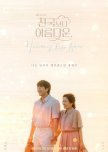
This review may contain spoilers
Promising Beginning, Slows Down Midway
The drama starts off strong, with an intriguing premise and a visually captivating portrayal of the afterlife. The way Heaven and Hell are depicted is particularly impressive—creative, immersive, and emotionally resonant. The acting throughout is solid, and the storyline has moments of brilliance. However, as the series progresses, the pacing begins to drag. Episodes feel unnecessarily stretched, and the momentum that made the beginning so gripping begins to fade.One lingering issue is the lack of clarity around the character of Hae-suk. While the final episodes reveal that Somi is actually a forgotten memory of Hae-suk, the show never properly explores or explains what the young Hae-suk was like. This creates a confusing gap, especially since Hae-suk and Nak-joon had lived together in the past. It's hard to believe that neither of them would recognize any resemblance between Somi and young Hae-suk. A deeper exploration of that connection could have added emotional weight and cohesion to the storyline.
Another point of emotional complexity comes in the final episode, when Nak-joon says he has “tied her down for way too long.” While it’s a touching moment, it raises questions. Each time he was reborn, he tried to do better—but if he didn't remember his past lives, how could he intentionally improve? Life is inherently full of ups and downs, and the burden of guilt seems unfairly placed on him. In contrast, Hae-suk lived a fulfilling life in one of her past incarnations, even finding happiness with a husband despite his paralysis. Meanwhile, Nak-joon silently grieved throughout his life for their lost son. His pain is portrayed quietly, almost overlooked, adding a layer of emotional imbalance to their stories. His silent suffering—carried alone across lifetimes—feels unresolved, especially when compared to the closure and peace Hae-suk seemingly finds.
In summary, while the drama offers a unique concept, impressive world-building, and strong performances, it falters in pacing and leaves some important emotional threads underdeveloped. The ending tries to be poignant, but instead raises more questions than it answers, especially regarding memory, identity, and the emotional consequences of past lives.
Was this review helpful to you?


